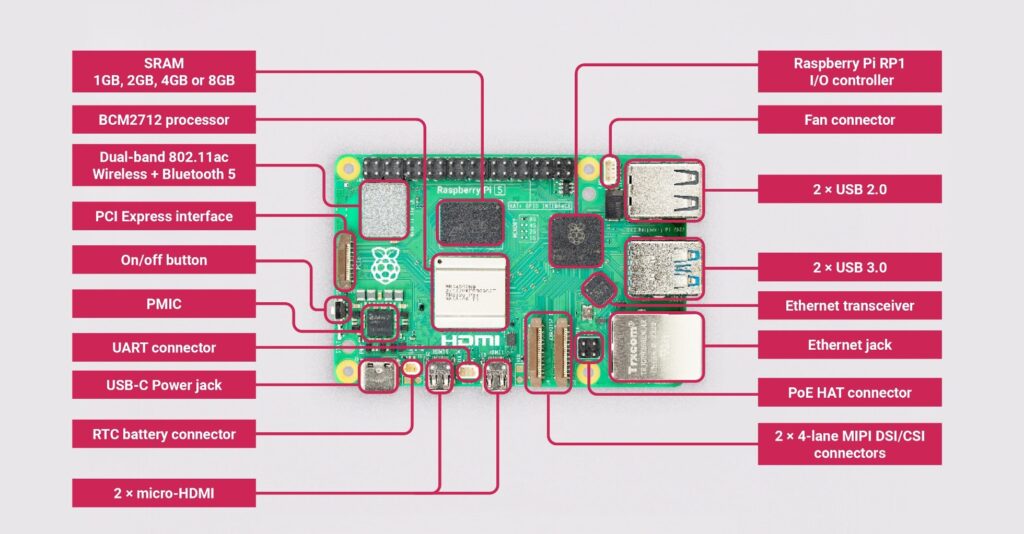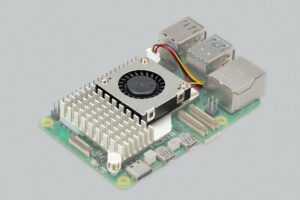- Raspberry Pi 5 – Raspberry Pi
- Raspberry Pi 5 発表のご案内 – Raspberry Pi Shop By KSY
- 「Raspberry Pi® 5」スイッチサイエンスは2024年2月13日販売開始 – PR Times
2023年9月23日にPi 5が発表、日本国内で発売に必要な技適の取得等で遅れること約5か月、2024年2月13日にようやく「Raspberry Pi 5(4GB/8GB)」の2種類が日本国内で販売を開始。
価格
前モデルのRaspberry Pi 4 4GBが10,890円(スイッチサイエンス)、Raspberry Pi 4 8GBが14,410円(スイッチサイエンス)と考えれば4GB版が+3,190円、8GB版が+880円となっており、途中Pi 4は製造コスト上昇により値上げが行われているため、大幅な値上がりとはなっていない事が分かります。
価格的には「Raspberry Pi Shop By KSY」側の方がお安くなっています。
Raspberry Pi 5レビュー類
- Introducing: Raspberry Pi 5! – Raspberry Pi 公式
- Raspberry Pi 5レビュー – SWITCH SCIENCE
- Raspberry Pi 5レビュー – CoderDojo西神
- Raspberry Pi 5 実機レビュー(外観編) – Japanese Raspberry Pi Users Group
- Raspberry Pi 5 実機レビュー(ベンチマーク編) – Japanese Raspberry Pi Users Group
- 最新版Raspberry Pi 5レビュー、ラズパイ4との違い – ラズパイスクール
CPU/GPU周りの強化により、動画を見ながらブラウジング等しても負荷でカーソルが飛ぶといった事は無くなった模様。
ようやくPCとしてマルチに使えるスペックまで底上げされたと言えそう。
Raspberry Pi 4のケース類はPi 5と互換無し
- Piケース 公式 for Pi 5 赤/白[SC1159] – Raspberry Pi Shop By KSY
- Raspberry Pi 5用公式ケース Red/White – スイッチサイエンス
- Raspberry Pi 5 ケース 検索 – Amazon.co.jp
- Raspberry Pi 5 ケース 検索 – 楽天市場
- Raspberry Pi 5 ケース 検索 – Yahooショッピング
有線LAN/RJ45の位置が異なるためRaspberry Pi 4のケースはPi 5と互換性無し。
別途Pi 5用のケースは購入する必要があります。
PoE用のピンが移動、Pi 4と互換無し
Raspberry Pi 4等で利用していた拡張基板系(HAT)もPoE用のピンが移動したため使用不可。
今後Raspberry Pi 5用のPoEアダプタが販売される予定ですが、2024年2月時点で公式のPoEアダプタはまだ販売されていません。
電源は推奨「5V/5A」だが…
- Powering Raspberry Pi 5 Raspberry Pi 5 review – www.raspberrypi.com
- USB電源アダプター 5V/3A 1.5m Type C コネクター [RASPW3C3180530] – Raspberry Pi Shop By KSY
- Raspberry Pi 5 USB Type-C 電源アダプタ 検索 – Amazon.co.jp
- Raspberry Pi 5 USB Type-C 電源アダプタ 検索 – 楽天市場
- Raspberry Pi 5 USB Type-C 電源アダプタ 検索 – Yahooショッピング
The first is the Raspberry Pi 15W USB-C Power Supply, which is the recommended supply for Raspberry Pi 4 and Raspberry Pi 400. The second is the Raspberry Pi 27W USB-C Power Supply, which provides up to 5A current at +5.1V, and is the recommended supply for Raspberry Pi 5.
The USB-C standard, used by the Raspberry Pi 4 supply, is limited to 5V at 3A, for a total power output of 15W. The USB-PD standard allows higher voltages and currents to be negotiated via software but requires an appropriate Power Management Integrated Circuit (PMIC) which is only present on Raspberry Pi 5. These supplies require that you use suitable USB-PD compatible cables.
While USB-PD-capable phone chargers advertise greater than 15W of power, virtually all of them achieve this by increasing the voltage instead of providing more current at +5V. If you are using a power supply that cannot provide 5A at +5V on first boot, you will be warned by the operating system that the current draw to peripherals will be restricted to 600mA.
USB Type-Cポートによる電源供給は「5V/5A」が必要(USB PD対応)とのことですが、USB機器類を使用しない場合は5V/3Aでも動作は可能。(但しOS上で右上に警告メッセージが出続ける)
今回純正の「Raspberry Pi 4/5用の5.1V/3A電源」及び「5.1V/5A電源」は負荷時でも安定して電源を供給できるよう電圧を5V→5.1Vに高く上げているとのこと。
- なぜRaspberry Pi 5の電源は5V5Aなのか? – IoT本舗
- Behind the scenes with Raspberry Pi 5 | #MagPiMonday – Raspberry Pi 公式
“Both the PMIC and the power supply support the USB Power Delivery (USB PD) standard. With USB PD there’s a little serial interface running over the power cable. You talk to the power supply, it starts off at five volts, but then you ask it: ‘what voltages do you support?’. And it says: ‘I support all these voltages.’ Usually it’s five, nine, 15, 20 volts if you’ve got a PC one. We could have just used a standard PD supply, get nine volts at three amps, but then you have to do the voltage conversion on the board. That costs you area, it costs you silicon, it costs you efficiency. So, we decided to do something a little bit non-standard, which is what we often do in search of performance, and create a five-volt, five-amp profile for our power supply. That means you don’t need all that conversion, but it can still support the board, and if you’re using the new supply we can support extra USB current downstream compared to Raspberry Pi 4. Or more HAT current.”
通常USB PDの仕様的に「5V/3A迄」となり、それ以降は「9V/3A」のように段階的に電圧が上がっていくはずが、Raspberry Pi 5はコストとチップ実装面積の兼ね合い、USB 3.0 Type-Aやより多くのHAT基板への電源供給を鑑みて「USB PDの仕様から外れた5V/5A」を採用するに至ったとのこと。
- Raspberry Pi 27W USB-C Power Supply – Raspberry Pi 公式
- Raspberry Pi 5 27W ACアダプター 検索 – Amazon.co.jp
- Raspberry Pi 5 27W ACアダプター 検索 – 楽天市場
- Raspberry Pi 5 27W ACアダプター 検索 – Yahooショッピング
現時点で公式の「Raspberry Pi 5 27W Type-C ACアダプター」は2024年2月時点で日本国内で販売されていないため、若干もにょる。
Pi 4で採用されていた「5V/4A前後」あれば問題なく動作するらしいので、公式のアダプタが出るまで繋ぎにするのはありかもしれません。
消費電力はRaspberry Pi 4とあまり変わらない
- Raspberry Pi 5レビュー – SWITCH SCIENCE
消費電力はアイドル時はRaspberry Pi 4とあまり変わらなさそうですが、負荷時(H.264、HEVC等の動画再生)は+2~3W前後増えており、概ね最大9W以下となっている。
ライバルとなりそうなIntel N100 PCが凡そ「アイドル時:10W~負荷時:30W以下」なので、省電力性で言えばPi 5が圧倒的です。
発熱周りはRaspberry Pi 4の時よりも厳しい
- Thermals Raspberry Pi 5 review – www.raspberrypi.com
Thanks to the passive heatsink that is fitted with the Active Cooler, we see a much lower idle temperature, at around 45°C. During extended testing under load, the fan of the Cooler spins up at low speed to stabilise the CPU temperature at 60°C, with maximum temperatures of 62 to 63°C being seen during the tests.
CPU/GPU性能が大幅に向上したものの、発熱周りがRaspberry Pi 4の時よりも厳しくなっている。ファンレスの状態でYouTubeで1080pの動画を再生しているとサーマルスロットリングが発生しているようなので、純正のヒートシンク+ファンセットの「Raspberry Pi Active Cooler」やサードパーティ製のヒートシンク、ファン等の追加が望ましい。
RP1チップへの統合
CPU(SoC)の「Broadcom BCM2712」からPCIe 2.0×4でぶら下げられた「RP1」チップには「SDIO、USB 2.0/3.0、有線LAN(1Gbps)、MIPI(CSI/DSI)、GPIO等」が統合されており、従来のRaspberry Pi 4で採用されていたVLI製のVL805ハブチップ経由ではなく「RP1」チップ経由となったお陰で、USB 3.0 Type-Aポートでフルの性能が発揮できるようになりました。
「Raspberry Pi Active Cooler」は取り外し出来ない
- Active Cooler Raspberry Pi 5 review – www.raspberrypi.com
- アクティブ クーラー 公式 for Pi5[SC1148] – Raspberry Pi Shop By KSY
- Raspberry Pi 5用アクティブクーラー – スイッチサイエンス
The Active Cooler has not been designed to be repeatedly removed from the Raspberry Pi 5.
「Raspberry Pi Active Cooler」は取り外しを考慮しているデザインではなく、基本付けたら付けっぱなしを想定。
ファン電源もPi 5から基板上に実装されているので、USB Type-Aや40ピンGPIOから取る必要も無くなりました。
公式的な見解では「ヒートシンク&ファンを取り付けなくても安定して動作する」との事ですが、サーマルスロットリングを起こしてCPUクロックが上下しているところを見ると「ほぼ必須」と思われます。
Pi 5用の純正ケースはファン付きに
- Raspberry Pi Case for Raspberry Pi 5 – Raspberry Pi 公式
- Piケース 公式 for Pi 5 赤/白[SC1159] – Raspberry Pi Shop By KSY
- Raspberry Pi 5用公式ケース Red/White – スイッチサイエンス
- Raspberry Pi 5 ケース 検索 – Amazon.co.jp
- Raspberry Pi 5 ケース 検索 – 楽天市場
- Raspberry Pi 5 ケース 検索 – Yahooショッピング
Raspberry Pi 5用の純正ケースはファン付き(4ピン/5V 8000RPM/2.79 CFM)となり、別売りのスタンドオフ、GPIOヘッダーエクステンダーの使用でHATの取り付けも可能になっています。
別途M.2 HAT基板やその他GPIOから何かしら生やす製品類の購入を考えている場合は、純正ケースではない方が良い場合もあるので、要ご確認を。
純正のPCIe 2.0 M.2 HAT基板は今後登場予定
- Raspberry Pi connector for PCIe Raspberry Pi 5 review – www.raspberrypi.com
An M.2 HAT which provides an M.2 connector to allow the use of NVMe drives is still in prototype, and has not yet been released.
PCIe 2.0にM.2 2280等のSSDを接続する別基板は2024年2月時点で公式では販売されていないものの、既にサードパーティから複数商品が販売されています。
PCIe 2.0 M.2 HAT基板はCPU用ヒートシンク/ファンやケース類との物理的干渉の可能性もあるので、増設をお考えの方は「M.2 SSD接続基板を作っているメーカーのケース、クーラー類」等のご検討を。
- Raspberry Pi 5用アクティブクーラー:836円
- Geekworm Raspberry Pi 5ケース P579(X1001 M.2 HAT互換有):1,899円
- Geekworm X1001 V1.1 M.2 2280拡張用ボード:2,599円
筆者は確実に使える上記製品をセットで買いました。
Pi 5から3.5mm AUX出力が廃止
Pi 5から3.5mm AUX出力は非搭載になっていますが、VID経由で増設するかHDMI経由から取るか、USBオーディオの追加のどれかになりそう。
最近の場合はHDMIで映像と音声を1本のケーブルで出力、ディスプレイ側で分離するタイプのものが多いのでそこまで問題にはならなさそう。
コスパの良さについて
今回筆者が購入した製品類は以下の通り。
・Raspberry Pi 5:15,290円
・Raspberry Pi 5用アクティブクーラー:836円
・Geekworm Raspberry Pi 5ケース P579(X1001 M.2 HAT互換有):1,899円
・Geekworm X1001 V1.1 M.2 2280拡張用ボード:2,599円
計:20,624円
電源アダプタは5V/4A出力の物を持っているµ SDカードも持っているため購入しませんでしたが、実際必要となると+3,000円ちょい加算となり、23,624円となりそう。
- GMKtec NucBox G3(Intel N100/DDR4-3200 8GB SODIMM/M.2 2280 PCIe 3.0×2 256GB/Wi-Fi 6/BT5.2/2.5GbE LAN/Win 11 Pro) – Amazon.co.jp
- GMKtec製のIntel N100を搭載したミニPC「NucBox G3」を簡単にレビューする – Recon-ReviewDays
ミニpc 最新第12世代インテルAlder Lake-N100 mini pc Windows 11 Pro DDR4 8GB+256GB SSD 4コア/4スレッド...
Intel N100搭載のRAM 16GB+512GBのコンパクトPCが2万円台で買える事を考慮すると、正直コスパはかなり悪く感じます。
N100系PCを搭載したx86 PCよりも本体サイズは半分程度、消費電力も3分の1程度で遊び甲斐のあるガジェットと考えれば悪くはありませんが、あれも必要、これも必要となるとコスパが悪くなるのは致し方ありません。
購入は以下より
- Raspberry Pi 5(4GB): 10,450円(KSY)~11,770円(スイッチサイエンス)
- Raspberry Pi 5(8GB): 14,080円(KSY)~15,290円(スイッチサイエンス)
- Raspberry Pi 5 4GB 検索 – Amazon.co.jp
- Raspberry Pi 5 8GB 検索 – Amazon.co.jp


